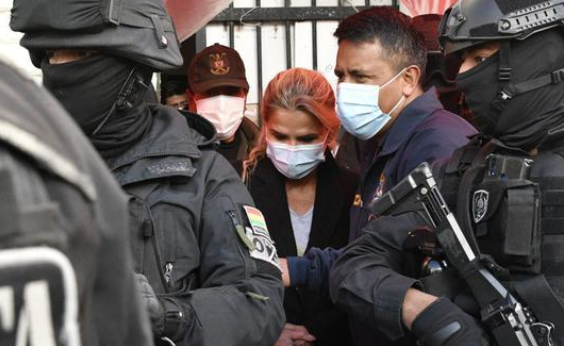The former president of Bolivia, Jeanine Áñez, will be tried in 2022 for the alleged crime of breach of duties and resolutions contrary to the Political Constitution of the State. The process will take place in the framework of a judiciary that has been extremely questioned by the public opinion due to its political dependence and the constant interpellation of the former president from sectors related to the MAS (Movement Toward Socialism). These sectors accuse her of being a coup leader for assuming the presidency in 2019 without respecting the internal procedures of the Plurinational Assembly.
However, it must be taken into account that Áñez assumed the presidency based on a constitutional sentence and at a critical moment due to the government vacuum in order to avoid further chaos, after the resignation of Evo Morales and all the authorities in charge of the presidential succession.
This political event continues to polarize Bolivian society and the question remains open: Is Jeanine Áñez the victim of a judicial system politically dependent on the government in power or is she to blame for the death of civilians who were demonstrating in favor of former president Morales?
Victim of a politicized judicial system?
Six factors must be taken into account to understand the rise of Jeanine Áñez to the presidency on an interim basis and her legal recognition by the Legislative Assembly with a MAS majority. First, Evo Morales violated the Constitution when he ran for a fourth consecutive time for the presidency in 2019 after a referendum denied him in 2016. Second, MAS congressmen did not attend the extraordinary session of the Assembly called to resolve the power vacuum. Third, on November 12, 2019, after Áñez assumed the presidency, the Plurinational Constitutional Tribunal (TCP) gave its legal backing to the succession under Constitutional Ruling 0003/01 of July 31, 2000, which is based on the “vacancy” of the president. The fourth certainty is that Morales was the one who summoned the OAS to audit the elections. The fifth certainty is the irregularities of the 2019 electoral process demonstrated by the OAS observers. And finally, Article 4 of the Exceptional Law for the Extension of the Constitutional Mandate of Elected Authorities, signed by MAS representatives in January 2020, states that “Exceptionally, the mandate of the President of the Plurinational State is extended… until the possession of the new authorities”.
The sociopolitical crisis of 2019 placed Áñez as a key actor with a margin of action because his investiture granted institutional certainty in the face of the chaos that developed before, during and after the chain of resignations of the ruling party (MAS) that led to political anarchy. Now, in 2022, Áñez finds herself the victim of a judicial system highly questioned for its partiality when it comes to political opponents of MAS.
According to her legal defense, there are numerous illegalities within the process. Among others, her health since she is on hunger strike, the splitting of the case and the trial through ordinary channels and not in the Legislative Assembly through a trial of responsibilities.
Guilty of the death of citizens?
An ill-fated event at the beginning of the administration of Áñez is the death of more than 30 citizens in the towns of Senkata (La Paz) and Sacaba (Cochabamba) as a result of military and police operations. This is the axis of the interpellation by MAS towards her interim government and the political-institutional conditions under which she was appointed president.
In order to explain the MAS’ questioning of the political-institutional conditions under which she took office as president, we identify four legal certainties. First, the Plurinational Assembly did not meet to admit or deny Evo Morales’ resignation from the presidency. Second, the parliamentary majority was not present to receive the oath of office of the President. Third, the Constitution establishes a line of presidential succession up to the president of the Chamber of Deputies (Áñez was the second vice-president of the Senate representing the minority opposition bloc). Finally, Supreme Decree No. 4078 of November 15, 2019, exempted armed forces personnel who participated in the re-establishment of internal order from criminal liability.
In synthesis, the violations of the Magna Carta and the deaths set the stage for MAS to accuse Áñez as guilty of breaking the constitutional order.
Paradoxical, catastrophic, unjust, and reprehensible
It is paradoxical that the Plurinational Assembly, which did not swear her in to take office in 2019, then, in 2020, extended her mandate, and that the Constitutional Tribunal recognizes her as president at the time and, later, with the new government of Luis Arce, denies it. The Supreme Decree that gave the green light to the military to shoot at mobilized citizens, free of any criminal responsibility, was catastrophic. A justice system that does not allow due process to a former president because she lacks the political power to back her up is unjust. And it is reprehensible to violate the Constitution, as Evo did to run for the fourth consecutive time for the presidency, and as Jeanine did in the Plurinational Assembly to be sworn in as president.
This double condition of the victim and guilty of Jeanine Áñez is contradictory because it responds to different certainties, criteria, ideologies, and premises. There is no single truth. In other words, for some, Áñez is a symbol of democracy and resistance, and for others of coup d’état and death. Therefore, as it is not a politically solvable case, it will continue to polarize Bolivian politics, which benefits a minority and harms the majority.
Translated from Spanish by Janaína Ruviaro da Silva











